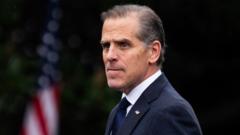As the conflict unfolds in Gaza, allegations of war crimes against both Israel and Hamas intensify, challenging the responses of international allies and calling for an urgent reevaluation of the situation on the ground.
Escalating War Crimes Allegations: Israel and Hamas Under Global Scrutiny

Escalating War Crimes Allegations: Israel and Hamas Under Global Scrutiny
Reports of war crimes mount against both Israel and Hamas, placing allies in a difficult position amidst rising tension in Gaza.
As the war rages on, the complex landscape of international politics in the Israel-Palestine conflict is coming under sharp scrutiny. Following the unprecedented attack by Hamas on October 7, 2023, which led to substantial casualties, particularly among Israeli civilians, the nature of this conflict has shifted into one marked by accusations of war crimes directed at both sides. Israeli Prime Minister Benjamin Netanyahu still perceives the situation through the lens of political strategy, focusing on long-term threats such as Iran while trying to navigate foreign relationships, notably with Saudi Arabia.
Despite some international support flooding in following the Hamas attacks, evidence supporting allegations against Israel's military actions has surged, eroding patience among its allies. Disturbing reports detail Israel's military operations in Gaza, which critics claim have led to mass civilian casualties and infrastructural devastation. The International Criminal Court has taken notice, issuing arrest warrants against Netanyahu and his former defense minister for their roles in these operations.
On the other side of the conflict, Hamas is accused of severe violations as well, including the targeted killing of civilians and the abduction of hostages. These acts further complicate narratives surrounding the legality of actions taken by both parties amidst the escalating violence.
The international community, including allies traditionally close to Israel, is expressing growing frustration over the humanitarian situation in Gaza. A joint statement issued by multiple foreign ministers condemned the failures of Israel's humanitarian aid strategies, describing them as detrimental to civilian welfare. Prominent political figures such as Britain's Foreign Secretary David Lammy have echoed these sentiments, stressing the urgent need for action.
In light of the increasing international pressure, Netanyahu's internal coalition faces a challenging landscape, where calls for a ceasefire are countered by nationalist factions within his government. As the Knesset prepares for its summer recess, opportunities for significant political movements on the ceasefire front may emerge, yet possible ramifications linger around both domestic politics in Israel and the broader geopolitical implications of the conflict.
While the immediate future remains uncertain, the potential for diplomacy could arise if a ceasefire is achieved. However, this does not erase the deepening scars of war—a conflict that, unfortunately, continues to illustrate the tragic costs of prolonged hostilities and the urgent need for peace.



















